 I was just a normal, everyday mother of three living a good life in Australia, minding my own business, when a public tragedy occurred that changed my perspective. The famous Crocodile Hunter and passionate conservationist, Steve Irwin, died suddenly in a stingray barb accident. Reeling from news of his death, I decided that more ‘little people’ like myself needed to take environmental action in order to fill his big shoes.
I was just a normal, everyday mother of three living a good life in Australia, minding my own business, when a public tragedy occurred that changed my perspective. The famous Crocodile Hunter and passionate conservationist, Steve Irwin, died suddenly in a stingray barb accident. Reeling from news of his death, I decided that more ‘little people’ like myself needed to take environmental action in order to fill his big shoes.
I decided to concentrate on orangutans because if we can’t prevent the extinction of the great apes, what hope do we have of saving any creature? I learned that the development of palm oil plantations is the single greatest threat to the survival of the wild orangutan. These plantations not only take over their homes, but orangutans are killed when they wander, displaced and starving, onto the plantations looking for food.
There is already much deforested and idle land in Indonesia where palm oil could be grown but companies choose to continue logging and reaping the immediate profits from the sale of the timber. These companies are usually owned by rich multi-nationals from Malaysia and China.
Incredible animals like the Sumatran tiger, Sumatran rhino, clouded leopard, Asian elephant, sun bear, gibbon and many species of primates live in these forests. They are not taken into care when their forest homes are logged and then burnt to the ground; they are killed and eaten or sold into the pet trade or used in Asian medicines.
 I was shocked and outraged and determined not to purchase or consume any more palm oil. I went to my supermarket intent on reading labels and choosing alternative vegetable oils. And then I discovered that palm oil was labeled under the umbrella of “vegetable oil†and that there was no easy way of identifying this ingredient. Frustrated, I decided to take the professional approach; I made a formal application to the Food Standards Australia New Zealand (FSANZ) to label palm oil.
I was shocked and outraged and determined not to purchase or consume any more palm oil. I went to my supermarket intent on reading labels and choosing alternative vegetable oils. And then I discovered that palm oil was labeled under the umbrella of “vegetable oil†and that there was no easy way of identifying this ingredient. Frustrated, I decided to take the professional approach; I made a formal application to the Food Standards Australia New Zealand (FSANZ) to label palm oil.
In March 2008, eighteen months later, the FSANZ Board met and reviewed my application. Their preliminary opinion, subject to my response, was to reject my application on the grounds that it did not fall within the scope of the FSANZ’s legislative capabilities. Using the domestic market to regulate international environmental affairs was not their job. Also, my application was not relevant to public health issues and this is the main domain of the FSANZ.
In my response to the FSANZ, I have pointed out that in 2000 they saw fit to label genetically modified food (GM food) while taking pains to reassure the public that there were no safety concerns. I have also argued that palm oil is high in saturated fat which is very unhealthy and that the public has a right to try to avoid it. I have argued that the nutritional information panel (NIP), which is mandatory for food in Australia and New Zealand, is inadequate for informing the public about their saturated fat intake because it requires them to add up every gram of fat in their diet. It would be much easier to simply avoid palm oil.
I am also writing letters to the Australian Federal government asking them to expand the FSANZ Act to include ethical and environmental concerns. With the reality of climate change upon us, I believe that every government needs to reform legislation to recognise environmental priorities and accomodate urgent environmental needs. There will be a need to label foods or products that contribute significantly to climate change to enable the public to take responsibility and affect supply through reduced demand.
 I am a member of the Palm Oil Action Group (POAG), which is a coalition of non governmental organisations (NGO’s) in Australia who have banded together for a common aim, to find solutions to the palm oil issues. Every NGO in this group has written a letter to FSANZ in support of my application to label palm oil. The POAG’s website is: www.palmoilaction.org.au
I am a member of the Palm Oil Action Group (POAG), which is a coalition of non governmental organisations (NGO’s) in Australia who have banded together for a common aim, to find solutions to the palm oil issues. Every NGO in this group has written a letter to FSANZ in support of my application to label palm oil. The POAG’s website is: www.palmoilaction.org.au
I would encourage every concerned individual to write to their government and Food Standards Body and request that environmental laws be strengthened and palm oil be labeled. I would be especially grateful if Australian and New Zealand citizens wrote to FSANZ and governments asking for the labeling of palm oil.
With palm oil labeling, a level of transparency will be introduced to the market which will give consumers the opportunity to use their purchasing power to influence the practices of these multinational companies. It is my hope that the conscious consumer can play an integral part in finding a solution to the tragedy that is unfolding in South East Asia. We need to do everything we can to save the magic of our rainforest biodiversity, combat deforestation-driven climate change and save ourselves from ourselves.
Dear Amanda E,
Thanks for all you are doing.
Do you think the time will ever come when government officials stop employing every ruse under the sun to protect the selfish interests of over-consumers and hoarders, and start by choosing to do the right thing?
Life and human institutions like national economies are utterly dependent upon the Earth for existence; but too many of our leaders view the Earth as some kind of thing to be manipulated, dissipated, and ravaged secondary to their adamant practice of a religion called Endless Economic Growth. This clear and obvious object of their idolatry is the soon to become unsustainable expansion of the leviathan-like, global political economy. What a colossal sham. What a shame. What a shambles for our children to confront.
Always with thanks,
Steve
Hi Steve. I think greed and selfishness are an integral part of human nature, driven by our most basic survival instinct. But we are capable of higher thinking involving compassion and selflessness. Let’s hope that some of our future leaders are capable of higher thinking. Until then, the more of us who scream and shout, the better.
Amanda
Amanda
I admire the work you are doing, but I completely disagree that greed and selfishness are human nature. It is the lust for wealth and power, generated by a few influential individuals at first, that have brainwashed the majority of people in industrial civilization into thinnking this is the only way to live. Tribal cultures have no concept of greed or selfishness — that would be suicidal: they only take what they need, and must co-operate in order to survive. Our, so-called, development as humans is not evolutionary — it is addiction, and there is a way back.
Keith
Hi Keith,
Fair enough. Maybe it’s a case of ‘power corrupts and absolute power corrupts absolutely’. If we are given more, we want more. Why is it that rich people always want more?
Interesting comment about tribal people taking only what they need because to take more would be suicidal. Maybe our modern day, greedy humans needs to experience the ‘suicidal’ nature of their actions. ie. When the ecology around them starts to collapse, they will stop taking.
Amanda
Good on you Amanda! You’re doing an excellent job lobbying politicians on forest issues, and campaigning for environmentally friendly product labelling.
Deforestation is responsible for 20% of global emissions. Rainforest clearance for oil palm plantations is a major driver of deforestation. For political reasons, the Kyoto Protocol actually excluded protection for forests. In hindsight, this was a grievous exclusion, particularly when we consider the amount of rainforest that has been destroyed in recent years. While delegates at the UN climate change meeting in Bali last December agreed to discuss including protection for forests in the post-2012 climate change agreement, forests remain unprotected and vulnerable during the period 2008-2012.
In March 2007, Australia launched its $200 million Global Initiative on Forests and Climate. During the Bali meeting, Norway’s Prime Minister, Jens Stoltenberg, announced that his country was prepared to increase its support to prevent deforestation in developing countries to more than US$500 million a year. Norway’s Minister of the Environment and International Development, Erik Solheim, said that “an initiative in this area in the next few years can bring about substantial cuts in greenhouse gas emissions while the world is seeking to put in place a new, more comprehensive agreement on climate change.†http://www.norway.org/policy/environment/avskoging_eng.htm
It would be fantastic if Australia and Norway could collaborate on addressing the problem of global deforestation, and invite other like-minded countries to join a focused alliance to offer practical and immediate support to rainforest countries to reduce deforestation during the critical period 2008 – 2012.
Dear Amanda,
Thank you for such an inspiring post. Here in the US, a lot of people are unfamiliar with palm oil– and totally unaware of its devastating effects on orangutans. We are finally starting to spread the word — and I think you serve as a great example for people who want to do their part to save orangutans, protect the forest and stop these insidious palm oil corporations from permanently destroying the earth.
I’ve put up your post and a link back to your site on the Orangutan Outreach blog: http://redapes.org
Keep up the great work! Rich
Richard Zimmerman
Director, Orangutan Outreach
http://redapes.org
Reach out and save the orangutans!
Hello Amanda,
I am writing from the UK. I have just read your artical and it has made me more determined to act to help save the forests from the devistation it is currently undergoing.
As soon as I end this note I will compile an email with a couple of attachments of the beautiful Orangutan and the deforistation. My mail will be sent to every single person in my address book and I will invite them to send it on. I will add a link to your page.THIS STUPIDITY MUST END.
Very best regards, Martin
This is crazy! Im a student and we are currently leaning about palm oil and its effects. THIS MUST END. I want my children to be able to see orangutans too. I want to make orangutans live their life as they were meant to, in a happy human-free environment. We wouldnt be happy if someone came and decided to take away our homes, food and water. So why would we do it to them? Governments should open their eyes and face reality. If it is not going to happen now then WHEN? when they are extinct?? THIS IS OUTRAGEOUS. Im writing from Australia and Im pretty sure everyone in my class(at least) agrees with me. Amanda, thank you so much for what you are doing and I hope I can help too. We are currently signing petitions to show the Government we care. Palm oil companies should see what they are oing to us, the environment and most importantly the orangutans.
GOOD LUCK!
M
M, why should orang-utans live in a “human free environment”? They have happily been co-existing with humans for thousands of years; it’s only the greed of the consumer culture, and it’s fatal lack of connection to the land (something the indigenous people of Sumatra, Borneo and New Guinea have never lost) that has led to us assuming it is acceptable to destroy a habitat for our pathetic consumer items.
Petitions will make no difference, and neither will companies change, because they do what they do in order to make a profit: sorry to disappoint you. It is the whole Culture of Maximum Harm that is the problem. I strongly recommend you read A Matter Of Scale (http://www.amatterofscale.com) and pass it on to your friends. As humans, we have to remember our place in nature, otherwise we die.
Thank you for writing this!
Please visit monkeyfriendly.com and if you’d like to join for free, email me and I will do the work of posting you and your org.